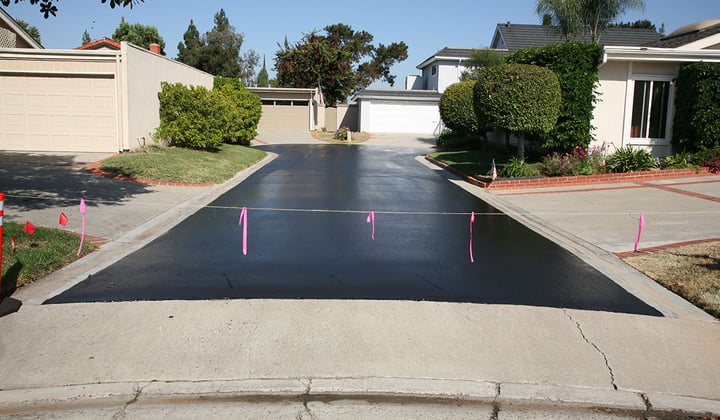Seal in Quality: Expert Solutions for Asphalt Repair and Sealing
Seal in Quality: Expert Solutions for Asphalt Repair and Sealing
Blog Article
Cold Mix Asphalt Vs. Hot Mix Asphalt: Which Is Right for You?

Structure Distinctions
Cold mix asphalt is created by emulsifying the asphalt binder with water and an emulsifying representative prior to blending it with accumulation. The hot mix asphalt production process involves heating the aggregate and asphalt binder separately before combining them at the asphalt plant.
Furthermore, cold mix asphalt has a tendency to be less dense and more flexible than hot mix asphalt. This flexibility makes it far better matched for locations with greater degrees of motion, such as driveways or roads with rush hour. On the other hand, warm mix asphalt is recognized for its high longevity and resistance to rutting and cracking, making it a recommended selection for highways and high-traffic roads where longevity is essential.
Installation Refine Variations
The procedure of mounting cold mix and hot mix asphalt shows notable variations in their requirements and treatments. In comparison, hot mix asphalt necessitates a much more intricate installation process. Due to the home heating needs, warm mix asphalt installations are usually lugged out by professionals with specialized devices, making sure an extra structurally sound and long-term outcome.
Durability and Longevity Elements
When thinking about asphalt options, resilience and longevity are critical aspects to examine for long lasting sidewalk performance. Hot mix asphalt (HMA) is recognized for its outstanding sturdiness and longevity.
In regards to durability, HMA typically outmatches CMA because of its exceptional toughness and resistance properties. HMA sidewalks have a longer life span, calling for less constant repair work and upkeep, which can translate to set you back savings over time. Additionally, HMA sidewalks are more quickly customizable to fulfill specific job requirements, additionally boosting their sturdiness.
Cost Considerations
Considering the financial implications is an essential aspect when assessing the choice between hot mix asphalt (HMA) and cold mix asphalt (CMA) for pavement tasks. While the first price of warm mix asphalt is normally greater than that of chilly mix asphalt, HMA typically offers a much more affordable solution in the lengthy run due to its premium longevity and long life.
In addition to product costs, it's crucial to think about the expenditures connected with installment and maintenance when contrasting HMA and CMA. Ultimately, the decision in between HMA and CMA should take into account not simply the initial expense yet likewise the lasting financial ramifications to establish the most affordable alternative for the specific pavement job.
Environmental Influence Comparison
Comparison of the ecological impacts between warm mix asphalt (HMA) and try this website cool mix asphalt (CMA) discloses distinct differences in sustainability methods. HMA manufacturing requires high temperature levels, bring about enhanced energy usage and greenhouse gas exhausts. The process also releases unstable natural substances (VOCs) and hazardous air pollutants (HAPs) into the environment. In comparison, CMA is generated and used at reduced temperature levels, reducing energy usage and emissions substantially. The reduced manufacturing temperature levels of CMA cause lowered gas intake and reduced degrees of carbon dioxide emissions, making it a more environmentally friendly option.
In addition, making use of CMA usually entails reusing existing asphalt pavement, promoting resource preservation and lowering the quantity of waste sent to landfills. This recycling facet better improves the sustainability of CMA compared to HMA. Overall, when considering the ecological effect, CMA becomes a more environmentally lasting option due to its lower power demands, minimized discharges, and the possibility for reusing existing products. By selecting CMA over HMA, road building projects can add positively to ecological preservation efforts.
Verdict
Finally, the option in between cold mix asphalt (CMA) and warm mix asphalt (HMA) relies on various aspects such as composition, setup procedure, resilience, durability, price, and environmental effect. asphalt repair. While CMA offers a cost-effective look here and quick option for small repairs, HMA makes sure premium resilience and durability for rush hour areas. Think about these aspects meticulously to determine which kind of asphalt is the appropriate choice for your paving needs

Taking into consideration the monetary effects is an important facet when assessing the selection between hot mix asphalt (HMA) and chilly mix asphalt (CMA) for sidewalk projects. While the preliminary price of warm mix asphalt is you can try these out usually greater than that of cold mix asphalt, HMA typically gives a more affordable remedy in the lengthy run due to its superior sturdiness and long life. cold mix asphalt.Comparison of the ecological effects in between warm mix asphalt (HMA) and cold mix asphalt (CMA) reveals unique differences in sustainability methods.In verdict, the selection in between cool mix asphalt (CMA) and hot mix asphalt (HMA) depends on various elements such as structure, setup procedure, longevity, longevity, cost, and environmental impact
Report this page